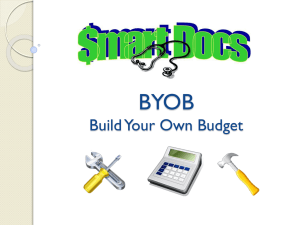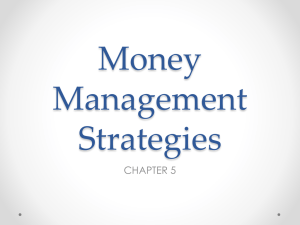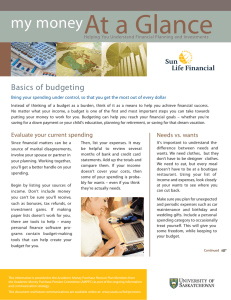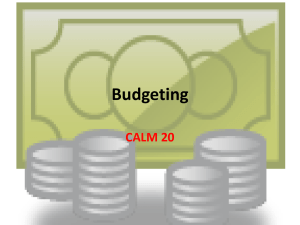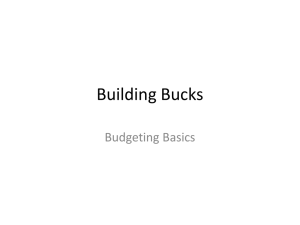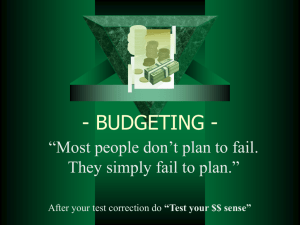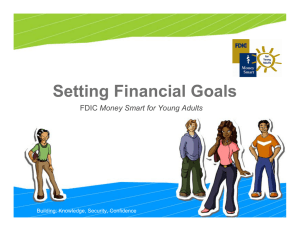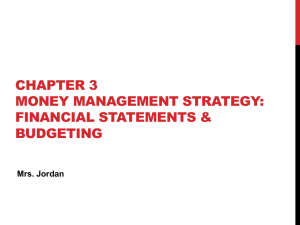Money Matters
advertisement
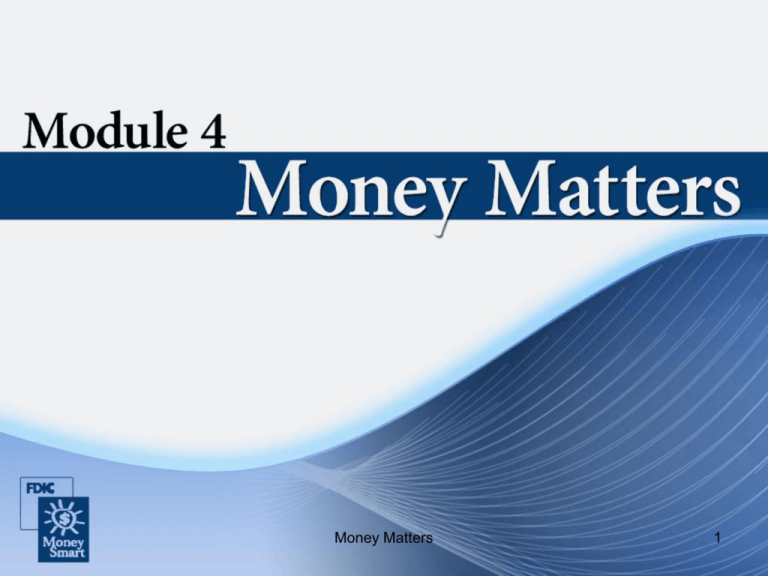
Money Matters 1 Introductions • Instructor and student introductions • Module overview Money Matters 2 Student Introductions • Your name • Expectations, questions, and concerns about budgeting Money Matters 3 Purpose Money Matters will help you: • Get a handle on how you spend your money. • Prepare and follow a personal spending plan or budget. Money Matters 4 Objectives By the end of this course, you will be able to: • Track daily spending habits. • Prepare a personal spending plan or budget to estimate monthly income and expenses. Money Matters 5 Objectives (Continued) • Identify ways to decrease spending and increase income. • Identify budgeting tools that will help you manage your money. Money Matters 6 Agenda and Ground Rules • • • • One hour long One 10-minute break Training methods Class participation Money Matters 7 Budget A step-by-step plan for meeting expenses in given period of time. Also called a “personal spending plan.” Money Matters 8 Benefits of Budgeting • Reduces money-related anxiety. • Gives you control of your financial situation. • Helps you build assets to improve your quality of life. Money Matters 9 How to Prepare a Budget 1. 2. 3. 4. Track daily spending. Determine income and expenses. Find ways to decrease spending. Find ways to increase income. Money Matters 10 Daily Spending Diary Day What did I spend my money on today? Sunday Monday Tuesday Wednesday Thursday Friday Saturday Money Matters 11 Income • • • • Wages Public assistance Child support Alimony • • • • Money Matters Interest Dividends Social security Other sources 12 Gross vs. Net Income Gross income = Total income without deductions Net income = Gross income minus SS, taxes, other deductions Money Matters 13 Social Security Benefits Social Security covers: • Retirement • Disability • Family • Survivors • Medicare benefits Money Matters 14 Social Security Statement A record of: • Your earnings. • Social Security taxes you have paid during your working years. • Estimate of monthly retirement, disability, and survivor benefits. Money Matters 15 Fixed vs. Flexible Expenses Fixed expenses = Expenses with amounts that don’t change from month to month. Flexible expenses = Expenses with amounts that may change from month to month Money Matters 16 Tax Credits • Earned Income Tax Credit (EITC). • Child tax credit. • Credit for Child and Dependent Care Expenses. • Education credits. • Tax credits for retirement savings contributions. Money Matters 17 Recordkeeping Tips • • • • Keep records in a safe place. Keep files organized. Keep tax records for at least 3 years. Send your bill payments before they are due. Money Matters 18 Budgeting Tools • • • • • Monthly payment schedule Monthly payment calendar Expense envelope system Budget box system Computer system Money Matters 19 Monthly Payment Calendar Month - _______ Sunday Monday Tuesday 1 2 Wednesday 3 Thursday 4 $2,000 pay check $160 $100-savings transportation $40-food $150-personal 8 Friday Saturday 5 $800 child support 6 7 $1,000 rent 9 10 11 12 13 14 16 17 18 19 0 21 23 24 27 28 $25-savings 15 $40 phone bill 22 $200 credit card 25 26 $550 child care 29 30 Money Matters 20 What To Pay First • Rent or mortgage • Utilities • Food Money Matters 21 Loan Payment Decisions • Pay off loans with the highest interest rate first. • Talk to your creditors. • Get credit counseling. • Enroll in a debt management plan. • Consider bankruptcy only as a last resort. Money Matters 22 Practice Exercise: Budget Considerations Instructions: • Read the scenario. • Answer the questions. • Be prepared to explain your answers. Money Matters 23
